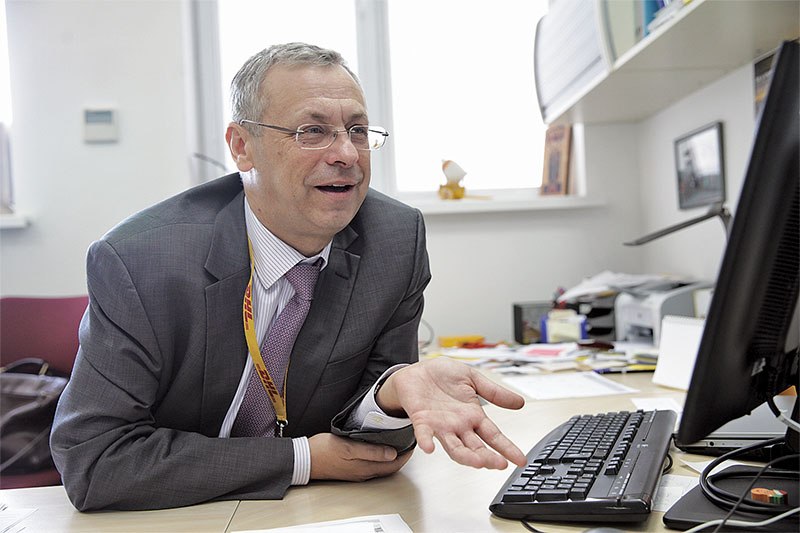For Vadim Sidoruk, the “made-in-Ukraine” country manager of DHL Express Ukraine, life-shaping events took place during his university years just before the dawn of the Mikhail Gorbachev era in the Soviet Union.
In 1983, the Lviv native started working as a tourist guide, putting him in close contact with hundreds of foreigners over the nearly 10 years he held the job. He grew confident speaking English in front of crowds, traveling widely (at least around the U.S.S.R.) and learning about the outside world from conversations with the visitors.
Sidoruk said the experience has stayed with him his whole life. In his case, it helped him succeed in his career at DHL, the global logistics and shipping giant, which he joined in 1993.
Some of those lessons?
Contrary to the hypocrisy of Soviet politicians and bosses, he learned that managers should communicate with employees honestly and frequently, even when making unpopular decisions.
He prides himself on a low turnover rate, under 10 percent annually. While he describes the pay as only average, the wages are 100 percent official, transparent and taxed. He thinks that employees should be happy at work, since they are spending as much time with their colleagues as they are with their own families.

Vadim Sidoruk
Title: Country Manager, DHL Express
Nationality: Ukrainian (born in Lviv)
Birth: 1962.
How to succeed in Ukraine: “Patience and focus.”
“I am in the people business,” Sidoruk said. “Every day has to be the best day.”
Sidoruk’s love of travel and meeting people continued after the demise of the Soviet Union in 1991, an event that he confesses that he did not see coming “up to the last day until it collapsed.” Independent Ukraine opened new vistas for him. So far he’s visited 80 countries, where he indulges in his hobby of nature photography.
Fast forward to today’s challenges in his third year as DHL’s country manager. There are plenty of them.
Some 20 percent of the DHL Express business in Ukraine came from the eastern Donbas before Russia launched its war a year ago. After the fighting started, DHL Express offices were looted in Donetsk and nine delivery vans stolen. The company also shut down its operations in Crimea after the Russian annexation in March 2014.
So does this mean that the express delivery service is hurting?
Far from it, says Sidoruk, whose Ukraine operations are a tiny, but bright, sliver of the global giant’s business.
Deutsche Post DHL Group’s worldwide revenue came in at $60 billion in 2014, some 70 percent of Ukraine’s expected gross domestic product of $85 billion this year. The company that employs 150,000 people globally doesn’t give out revenue breakdowns by country, but “you can hardly find a country where DHL is not successful,” he said of the company with the distinctive red-and-yellow logos.
Despite war, revolution and recession, DHL Express Ukraine will “exceed projections” with double-digit sales growth this year, Sidoruk said. That’s good news for the 350 employees who work from a giant office-warehouse complex, formerly a steel mill, where they share space with Ukraine’s Customs Service. The 9 Lugova St. address is near Karavan Megastore.
Sidoruk said that Crimea never generated a lot of revenue. And, while the war has been disastrous for Donbas business, he estimates that the company lost only half of its customers there. The other half, he said, migrated to Lviv, Odesa, Mariupol, Kharkiv and other relatively unaffected cities.
Sidoruk sees one big and optimistic trend from his perch. “Export is our driver at the moment,” he said.
While hryvnia devaluation has cut imports, as expected, exports are increasing as domestic companies send out more samples or products all over the world in hopes of landing new contracts. The made-in-Ukraine list is impressive and includes foodstuffs, fast-moving consumer goods and textiles. DHL Express Ukraine sees that shipments to all regions of the world are up, except for trade with Russia, which has dropped sharply.
The developments suggest to Sidoruk that Ukraine’s path to a brighter economy is through greater exports. He says he’s “amazed by the quality” of Ukrainian-made goods, not just the products but also the packaging, which Sidoruk says has improved greatly in recent years.
He’s seen progress in his 22 years with the company in other areas as well.
Up until a few years ago, Ukraine’s Customs Service held up deliveries of even small packages with items worth less than 150 euros. “Everything that came into the country was stopped,” he said with amazement. No longer. But those changes, along with “trying to make things happen without bribes,” took years of lobbying government officials at various levels, he said.
While he doesn’t like talking about competitors TNT, Meest, United Parcel Service and Federal Express, Sidoruk touts DHL Express Ukraine’s 65 percent market share — practically a monopoly, albeit one with the other big names still doing business.
Not surprisingly, DHL Express is highly automated, modern and runs like clockwork: A Boeing 737 or Boeing 757 jet flies up to 15 tons of cargo into the country at 9 a.m., mainly from Leipzig, Germany. The same plane takes outbound shipments at 9 p.m. Shipments in Ukraine are processed at the Kyiv warehouse for local delivery about 2 p.m., which is the same time that customers need to drop off their packages to ensure that they will make the evening flight. DHL Express has 35 service centers throughout the nation and a fleet of more than 100 vehicles.
Aside from the business he runs, Sidoruk believes that his homeland is “just breaking away from the Soviet Union and Soviet mentality,” a prospect he welcomes.
But the nation can’t do it alone.
“The West has to help Ukraine,” he said. “Financial help is important and also with the know-how. For me what is connected to the West is not just financial, it’s a set of values that are close to Ukraine.”
Kyiv Post chief editor Brian Bonner can be reached at [email protected]
